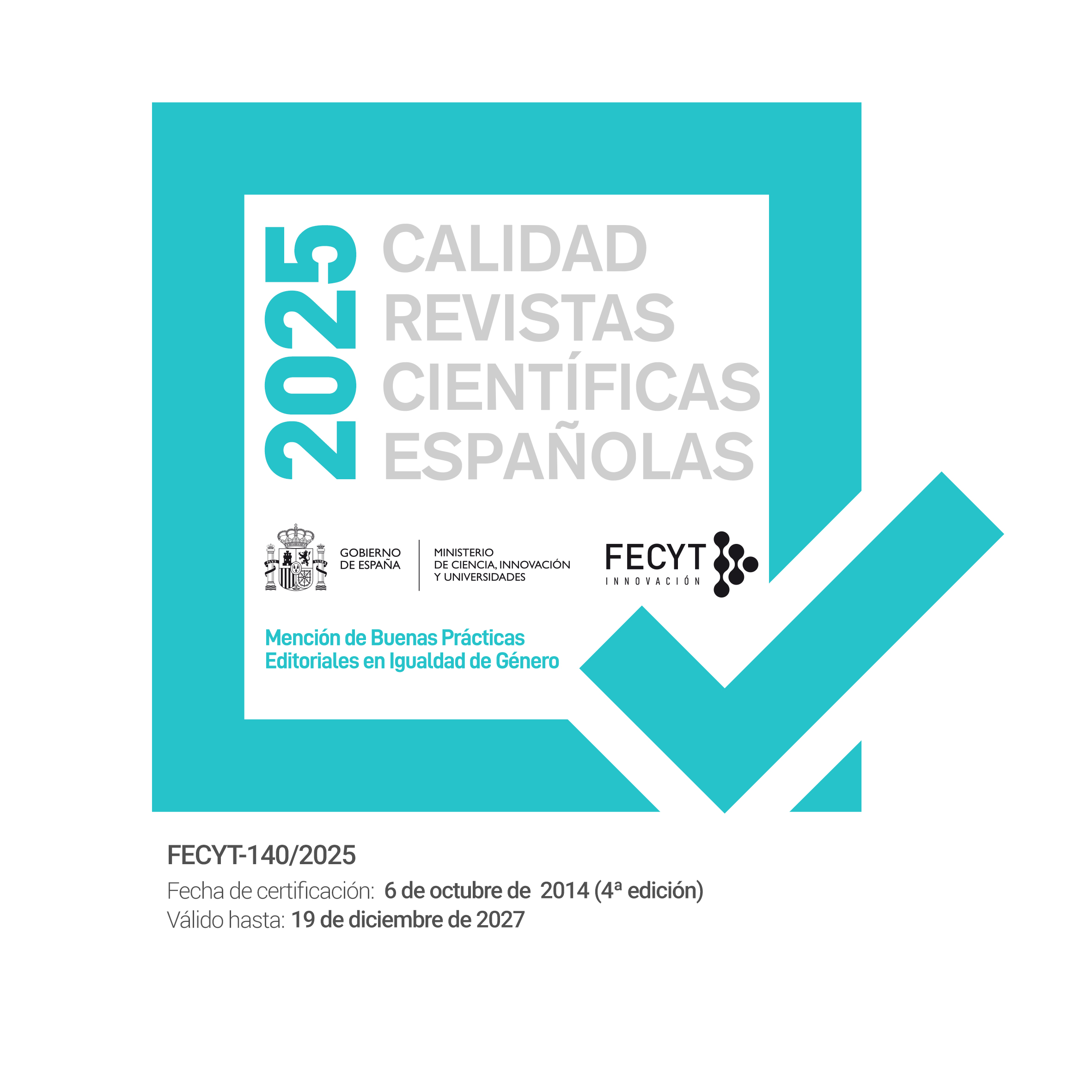La implicación agencial: el efecto predictivo de la calidad docente y las necesidades psicológicas básicas
DOI:
https://doi.org/10.5944/educxx1.42912Palabras clave:
implicación agencial, calidad docente, necesidades psicológicas básicas, modelos de ecuaciones estructurales, educación superiorResumen
La manera en que el alumnado universitario se implica de forma agéntica en el aula requiere de esclarecimiento, ya que se trata de un momento evolutivo caracterizado por el riesgo de sufrir motivacionalmente debido al aumento de las exigencias académicas. Por tanto, el objetivo de este estudio es someter a prueba un modelo teórico según el cual, la calidad docente (relevancia del aprendizaje y fomento de la participación) predice la implicación agencial a través de la satisfacción de las necesidades psicológicas básicas de autonomía, competencia y relación. En este estudio participaron 485 estudiantes de edades comprendidas entre los 17 y los 34 años (M = 20.19; DT = 2.05) de entre los cuales 161 eran hombres (33.2%), 320 mujeres (66%) y 4 personas no binarias (0.8%). Se utilizó el Cuestionario de Calidad Docente, la Escala de Satisfacción de las Necesidades Psicológicas Básicas y el Classroom Engagement Scale para evaluar las variables incluidas en este estudio. Los resultados muestran que la promoción de la utilidad y el interés predice directamente las necesidades psicológicas básicas e indirectamente, la implicación agencial a través de la satisfacción de dichas necesidades psicológicas. En cambio, se constata la ausencia de capacidad predictiva del fomento de la participación sobre las necesidades psicológicas básicas y la implicación agencial. Este estudio muestra la relevancia que tienen las necesidades psicológicas básicas sobre la implicación agencial y pone de manifiesto que ciertas estrategias de la calidad docente podrían no estar directamente vinculadas a la agencia del alumnado en el aula de educación superior. En consecuencia, se observa que aún hay mucho por seguir investigando, siendo preciso identificar prácticas educativas cruciales y eficaces que fomenten dicho compromiso a fin de optimizar el proceso de enseñanza- aprendizaje universitario.
Descargas
Citas
Albarrán-Torres, F. A., & Díaz-Larenas, C. H. (2021). Metodologías de aprendizaje basado en problemas, proyectos y estudio de casos en el pensamiento crítico de estudiantes universitarios. Revista de Ciencias Médicas de Pinar del Río, 25(3), e5116.
Bohórquez Gómez-Millán, M., & Checa Esquiva, I. (2019). Desarrollo de competencias mediante ABP y evaluación con rúbricas en el trabajo en grupo en Educación Superior. REDU. Revista de Docencia Universitaria, 17(2), 197-210. https://doi.org/10.4995/redu.2019.9907
Chacón-Cuberos, R., Lara-Sánchez, A. J., & Castro-Sánchez, M. (2021). Basic psychological needs and their association with academic factors in the Spanish university context. Sustainability, 13(5), 2449. http://doi.org/10.3390/su13052449
Chaudhry, S., Tandon, A., Shinde, S., & Bhattacharya, A. (2024). Student psychological well-being in higher education: The role of internal team environment, institutional, friends and family support and academic engagement. Plos one, 19(1), e0297508. https://doi.org/10.1371/journal.pone.0297508
Christ, A. A., Capon-Sieber, V., Grob, U., & Praetorius, A. K. (2022). Learning processes and their mediating role between teaching quality and student achievement: A systematic review. Studies in Educational Evaluation, 75, 101209. https://doi.org/10.1016/j.stueduc.2022.101209
Cohen, R., Moed, A., Shoshani, A., Roth, G., & Kanat-Maymon, Y. (2020). Teachers’ conditional regard and students’ need satisfaction and agentic engagement: A multilevel motivation mediation model. Journal of Youth and Adolescence, 49, 790-803. https://doi.org/10.1007/s10964-019-01114-y
Conesa, P. J., Onandia-Hinchado, I., Dunabeitia, J. A., & Moreno, M. Á. (2022). Basic psychological needs in the classroom: A literature review in elementary and middle school students. Learning and Motivation, 79, 101819. https://doi.org/10.1016/j.lmot.2022.101819
Cook-Sather, A., Allard, S., Marcovici, E., & Reynolds, B. (2021). Fostering agentic engagement: Working toward empowerment and equity through pedagogical partnership. International Journal for the Scholarship of Teaching and Learning, 15(2), 1-9. https://doi.org/10.20429/ijsotl.2021.150203
DeLay, D., Laursen, B., Kiuru, N., Poikkeus, A. M., Aunola, K., & Nurmi, J. E. (2016). Friend influence and susceptibility to influence: Changes in mathematical reasoning as a function of relative peer acceptance and interest in mathematics. Merrill-Palmer Quarterly, 62(3), 306-333. https://doi.org/10.13110/merrpalmquar1982.62.3.0306
Fletcher, A. K. (2024). Self-assessment as a student-agentic zone of proximate competence development. Educational Review, 76(4), 956-978. https://doi.org/10.1080/00131911.2022.2103520
Gómez-Carrasco, C. J., Rodríguez-Medina, J., Miralles-Martínez, P., & Árias-González, V. B. (2021). Effects of a teacher training program on the motivation and satisfaction of history secondary students. Revista de Psicodidáctica, 26(1), 45-52. https://doi.org/10.1016/j.psicoe.2020.08.001
Granero-Gallegos, A., Escaravajal, J. C., López-García, G. D., & Baños, R. (2022). Influence of teaching styles on the learning academic confidence of teachers in training. Journal of Intelligence, 10(3), 71. http://doi.org/10.3390/jintelligence10030071
Granero-Gallegos, A., Hortigüela-Alcalá, D., Hernando-Garijo, A., & Carrasco-Poyatos, M. (2021). Estilo docente y competencia en Educación Superior: Mediación del clima motivacional. Educación XX1, 24(2), 43-64. https://doi.org/10.5944/educXX1.28172
Hair, J., Black, W., Babin, B., Anderson, R., & Black, W. C. (2018). Multivariate data analysis (8th ed.). Cengage Learning.
Harrison, M. G., Wang, Y., Cheng, A. S., Tam, C. K. Y., Pan, Y. L., & King, R. B. (2025). School climate and teacher wellbeing: The role of basic psychological need satisfaction in student-and school-related domains. Teaching and Teacher Education, 153, 104819. https://doi.org/10.1016/j.tate.2024.104819
Jang, H., Kim, E. J., & Reeve, J. (2012). Longitudinal test of self-determination theory’s motivation mediation model in a naturally occurring classroom context. Journal of Educational Psychology, 104, 1175-1188. https://doi.org/10.1037/a0028089
Jiang, A. L., & Zhang, L. J. (2021). University teachers’ teaching style and their students’ agentic engagement in EFL learning in China: A self-determination theory and achievement goal theory integrated perspective. Frontiers in Psychology, 12, 704269. https://doi.org/10.3389/fpsyg.2021.704269
Khuram, W., Wang, Y., Khan, S., & Khalid, A. (2021). Academic attitude and subjective norms effects on international doctoral students’ academic performance selfperceptions: A moderated-mediation analysis of the influences of knowledgeseeking intentions and supervisor support. Journal of Psychology in Africa, 31(2), 145-152. https://doi.org/10.1080/14330237.2021.1903188
Krpanec, E., Popović, D., & Babarović, T. (2024). How can teachers encourage students’ agentic engagement? The role of autonomy-supportive teaching and students’ autonomous motivation. En P. Valerjev & I. Tucak (Eds), The psychology days in Zadar: Book of selected proceedings (pp. 65-72). Morepress.
Leo, F. M., Mouratidis, A., Pulido, J. J., López-Gajardo, M. A., & Sánchez-Oliva, D. (2022). Perceived teachers’ behavior and students’ engagement in physical education: The mediating role of basic psychological needs and self-determined motivation. Physical Education and Sport Pedagogy, 27(1), 59-76. https://doi.org/10.1080/17408989.2020.1850667
León, J., Domínguez, E., Núñez, J. L., Pérez, A., & Albo, J. M. (2011). Traducción y validación de la versión española de la Échelle de Satisfacción des Besoins Psychologiques en el contexto educativo. Anales de Psicología, 27(2), 405-411. https://doi.org/10.6018/analesps
León, J., Medina-Garrido, E., & Núñez, J. L. (2017). Teaching quality in math class: The development of a scale and the analysis of its relationship with engagement and achievement. Frontiers in Psychology, 8, 895. https://doi.org/10.3389/fpsyg.2017.00895
Marginson, S. (2024) Student self-formation: an emerging paradigm in higher education. Studies in Higher Education, 49(4), 748-762. https://doi.org/10.1080/03075079.2023.2252826
Molinari, L., & Mameli, C. (2018). Basic psychological needs and school engagement: A focus on justice and agency. Social Psychology of Education, 21(1), 157-172. https://doi.org/10.1007/s11218-017-9410-1
Montenegro, A. (2019). Why are students’ self-initiated contributions important? A study on agentic engagement. International Journal of Sociology of Education, 8(3), 291-315. https://doi.org/10.17583/rise.2019.4540
Murtonen, M., Aldahdouh, T. Z., Vilppu, H., Trang, N. T. T., Riekkinen, J., & Vermunt, J. D. (2024). Importance of regulation and the quality of teacher learning in student-centred teaching. Teacher Development, 28(4), 534-552. https://doi.org/10.1080/13664530.2024.2318329
Naidu, S. (2024). In defense of expertise—Teachers, teaching, and teaching design. Distance Education, 45(4), 493-496. https://doi.org/10.1080/01587919.2024.2423443
Núñez, J. L., & León, J. (2019). Determinants of classroom engagement: A prospective test based on self-determination theory. Teachers and Teaching, 25(2), 147-159. https://doi.org/10.1080/13540602.2018.1542297
Palazuelos, E., San-Martín, P., Montoya del Corte, J., & Fernández-Laviada, A. (2018). Utilidad percibida del aprendizaje orientado a proyectos para la formación de competencias. Aplicación en la asignatura «Auditoría de cuentas». Revista de Contabilidad, 21(2), 150-161. https://doi.org/10.1016/j.rcsar.2017.04.004
Patall, E. A. (2024). Agentic engagement: Transcending passive motivation. Motivation Science, 10(3), 222-233. https://doi.org/10.1037/mot0000332
Patall, E. A., Kennedy, A. A., Yates, N., Zambrano, J., Lee, D., & Vite, A. (2022). The relations between urban high school science students’ agentic mindset, agentic engagement, and perceived teacher autonomy support and control. Contemporary Educational Psychology, 71, 102097. https://doi.org/10.1016/j.cedpsych.2022.102097
Quin, D., Hemphill, S. A., & Heerde, J. A. (2017). Associations between teaching quality and secondary students’ behavioral, emotional, and cognitive engagement in school. Social Psychology of Education, 20(4), 807-829. https://doi.org/10.1007/s11218-017-9401-2
Reeve, J., & Shin, S. H. (2020) How teachers can support students’ agentic engagement. Theory Into Practice, 59(2), 150-161. https://doi.org/10.1080/00405841.2019.1702451
Reeve, J., & Cheon, S. H. (2021) Autonomy-supportive teaching: Its malleability, benefits, and potential to improve educational practice. Educational Psychologist, 56(1), 54-77. https://doi.org/10.1080/00461520.2020.1862657
Reeve, J., Cheon, S. H., & Yu, T. H. (2020). An autonomy-supportive intervention to develop students’ resilience by boosting agentic engagement. International Journal of Behavioral Development, 44(4), 325-338. https://doi.org/10.1177/0165025420911103
Reeve, J., & Jang, H. (2022). Agentic engagement. En Reschly, A. L. y Christenson, S. L. (Eds.), Handbook of research on student engagement (pp. 95-107). Springer, Cham. https://doi.org/10.1007/978-3-031-07853-8_5
Rocca, K. A. (2010). Student participation in the college classroom: An extended multidisciplinary literature review. Communication education, 59(2), 185-213. https://doi.org/10.1080/03634520903505936
Ryan, R. M., & Deci, E. L. (2017). Self-determination theory: Basic psychological needs in motivation, development, and wellness. The Guildford Press.
Ryan, R. M., Deci, E. L., Vansteenkiste, M., & Soenens, B. (2021). Building a science of motivated persons: Self-determination theory’s empirical approach to human experience and the regulation of behavior. Motivation Science, 7(2), 97-110. https://doi.org/10.1037/mot0000194
Ryan, R. M., & Deci, E. L. (2020). Intrinsic and extrinsic motivation from a selfdetermination theory perspective: Definitions, theory, practices, and future directions. Contemporary Educational Psychology, 61, 101860. https://doi.org/10.1016/j.cedpsych.2020.101860
Santana-Monagas, E., & Núñez, J. L. (2022). Predicting students’ basic psychological need profiles through motivational appeals: Relations with grit and well-being. Learning and Individual Differences, 97, 102162. https://doi.org/10.1016/j.lindif.2022.102162
Singh, A. B. (2024). Teaching and learning in an Institutional Massive Open Online Course: Implications for agency in online pedagogy (Publicación núm. 379) [Tesis doctoral, Universidad de Oslo]. Duo Research Archive.
Skinner, E. A., & Raine, K. E. (2022). Unlocking the positive synergy between engagement and motivation. En A. L. Reschly y S. L. Christenson (Eds.), Handbook of research on student engagement (pp. 25-56). Springer, Cham. https://doi.org/10.1007/978-3-031-07853-8_2
Skinner, E. A., Pitzer, J., & Brule, H. (2014). The role of emotion in engagement, coping, and the development of motivational resilience. En R. Pekrun & L. Linnenbrink-Garcia (Eds.), International handbook of emotions in education (pp. 331-347). Routledge.
Vansteenkiste, M., Ryan, R. M., & Soenens, B. (2020). Basic psychological need theory: Advancements, critical themes, and future directions. Motivation and Emotion, 44(1), 1-31. https://doi.org/10.1007/s11031-019-09818-1
Wong, V. W., Ruble, L. A., Yu, Y., & McGrew, J. H. (2017). Too stressed to teach? Teaching quality, student engagement, and IEP outcomes. Exceptional children, 83(4), 412-427. https://doi.org/10.1177/0014402917690729.
Wong, Z. Y., & Liem, G. A. D. (2022). Student Engagement: Current State of the Construct, Conceptual refinement, and future research directions. Educational Psychology Review, 34(1), 107-138. https://doi.org/10.1007/s10648-021-09628-3

Descargas
Publicado
Versiones
- 2025-06-23 (2)
- 2025-06-20 (1)
Cómo citar
Número
Sección
Licencia
Derechos de autor 2025 Arantza Fernandez Zabala, Inge Axpe Saez, Lorea Azpiazu Izaguirre, Iker Izar de la Fuente Diaz de Cerio

Esta obra está bajo una licencia internacional Creative Commons Atribución-NoComercial 4.0.
La revista Educación XX1 se publica bajo licencia Creative Commons Reconocimiento-NoComerciaL 4.0 (CC BY-NC 4.0). Se permite la generación de obras derivadas siempre que no se haga un uso comercial. Tampoco se puede utilizar la obra original con finalidades comerciales.










